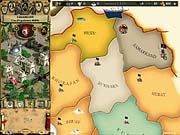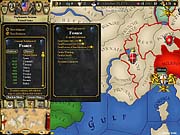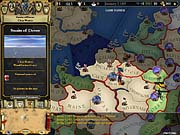Europa Universalis II Preview
Paradox Entertainment producer Gustaf Magnuson gives us all the details on the sequel to Europa Universalis.
You couldn't find a more unlikely hit than Europa Universalis. Paradox Entertainment's look at what could only be described as the birth of modern European civilization was every bit as complex as those words would lead one to believe, requiring more of its players than any other game released this year. It fully encompassed the three centuries from 1492 to 1792, providing a panoramic overview of momentous events and the renowned leaders who shaped them. Few historical games have offered such a complete experience, and none has delved into minutiae with such obvious enthusiasm.

Not so unlikely is the recently announced development of Europa Universalis II for release this holiday season in North America. The commercial and critical success of the first game made such a sequel a certainty, although the speed with which it is arriving is perhaps a bit of a surprise. Rapid production time or not, Paradox seems to making sure that potential consumers will get their money's worth. A lot of additions are planned for the follow-up, most notably an expansion of the timeline by a full century. Gamers can now begin their conquests in 1419, at the tail end of the Hundred Years' War between England and France, and continue until the close of the Napoleonic era in 1820. The incorporation of these two periods--always popular ones for wargamers and strategy buffs--should enhance the appeal of Europa Universalis concept all on its own.

But there's still much more. In addition to the sheer charisma provided by the inclusion of Joan of Arc and Napoleon, the gameplay mechanics will be significantly altered. New battlefield technology--perhaps most importantly the first effective use of gunpowder during the closing engagements in the Hundred Years' War--should remind veteran players that this isn't the same old Europa Universalis. The first game's historical core is also being enhanced with new units that bring the Renaissance and Baroque periods to life. These include a number of additions that will provide more options on the battlefield, by land and by sea.
The scope of the original is being dramatically expanded. Along with the traditional European powers, players will be able to serve as the heads of state of some 140 nations spread out across the globe. Historical leaders and dynasties from even the smallest territories are being included to further boost the game's historical accuracy. Special effort seems to have been made in regard to the Far East. Feudal Japan and imperial China figure prominently on the list of new countries, as do events like the Japanese Shogunate civil war and Eastern religions and philosophies such as Hinduism, Buddhism, and Confucianism.
Across-the-board interface and AI improvements are also being touted. Paradox is promising that Europa Universalis II will be easier to use than its forerunner, which attracted some negative press for being convoluted and lacking a instructive manual. Diplomacy, religion, and politics are expected to be refined, with more options for the player and a greater sense of individuality when dealing with the computer-controlled nations. You will be able to structure your state in nearly every way, choosing an ideology to promote and whether or not to embrace questionable methods such as espionage and the recruitment of mercenaries.
To gain a little more insight on the development of Europa Universalis II, we recently posed a few questions to Paradox Entertainment producer Gustaf Magnuson. Read on for the full interview.
GameSpot: As the original Europa Universalis was one of the most complex, detailed strategy games released in recent memory, how exactly do you follow that up? Most sequels add just add more of the same, but in this case it's hard to imagine what more could really be added.

Gustaf Magnuson: If "more of the same" equals more fun and detailed historical game features, then yes, we could be guilty of that. What we've tried to do also is to change some of the core aspects of the game. We have included an all-new event system, which will make the game feel completely different. You will, for example, get the option to select sides in the English civil war. We have also added two time periods, so you can save Byzantium from the Turkish onslaught, stop Napoleon from conquering the world, or even conquer the world as Napoleon.

GS: Can you go over some of the specific new features? Is there anything in particular that you really enjoyed implementing?
GM: For example, one of the features that I'm really excited about is the domestic policies system. In Europa Universalis, the national characteristic of a nation was hard-coded--for example, Spain got lots of colonists and Russian infantry was very cheap. In Europa Universalis II, we changed all that. We have developed a system where all characteristics of a nation are set by a set of rules. There are now eight categories of domestic policies, which can be changed gradually over time. This affects almost all of the game, from infantry prices to diplomacy. This allows you greater flexibility in playing the game, but it also explains more about why countries are the way that they are.
GS: Which gameplay additions do you think will make the most difference to the individual player? Are there any major changes that will immediately distinguish Europa Universalis II from the original game?
GM: The domestic policies system, the event system, the new time periods, and the aspects of non-European nations are the main things. I suspect many players will also like the concept of playing any nation they want.
GS: Have the core European states undergone any serious modifications? Or are the great powers like England, France, and Spain still essentially the same as they were in the original game?
GM: Since Europa Universalis II starts in 1419, the world map is completely different. In 1419, England is quite a bit stronger and controls large parts of northern France. France is disorganized into several smaller states, which are vassals to the French king. Spain does not even exist, as the countries of Castille and Aragon are not yet united.
GS: Can you discuss the new playable nations? What are some of the more interesting additions to the stable of playable states? I'm sure that a lot of people are interested in the additions from the Far East, like the Japanese Shogunate and the Chinese Empire.
GM: We have added several new nations in the Far East, countries ranging from Tibet to Atjeh, and of course lot of detail on China. The difference in religion and culture will make the Asian part of the game feel quite a lot different than the European aspects.
GS: Pushing the end of the timeline forward a century seems like a risky--albeit potentially rewarding--move, as there are significant technological and political differences between the beginning of the 18th century and the start of the 19th. Was the lure of including a figure like Napoleon so strong that you just had to inch the game closer to the modern era? And did this add some additional design hurdles to overcome?

GM: It is true that the Napoleonic age revolutionized warfare to such a large degree that it could not have been simulated well in Europa Universalis. The huge armies and ambitious political goals mean that we need a new peace settlement system, altered AI behavior, higher supply limits, and special events. Incidentally, we have all these things in Europa Universalis II. Of course, if you play the grand campaign, then the French revolution might never happen and Napoleon might end his days still a mere corporal.
GS: Would you characterize the Napoleonic era as the centerpiece of Europa Universalis II? Seems like you've got a natural subject for the box cover.
GM: It is a grand part of it, but I feel that the early time period is just as important a part. However, who would not want to take on the world with a great leader such as Napoleon?
GS: Will the general tone of Europa Universalis II be friendlier than that of its predecessor? One of the biggest gripes about the first game concerned a steep learning curve and an obtuse (but historically informative) manual that didn't provide enough information. Have those issues been addressed?
GM: We have rewritten the manual and are developing a new tutorial, which should be much more intuitive.
GS: Is multiplayer gaming an integrated part of Europa Universalis II? Its predecessor was a bit frustrating due to the lack of a few options and the absence of an online matching system.
GM: We are working on a better solution for a multiplayer server for matchmaking. The exact facts for this are not available at the moment.
GS: Europa Universalis was deep, but it was limited in terms of focus because of the absence of configurable settings and a scenario editor. Are there more options for customization in the sequel?
GM: We've expanded the amount of data that can be edited and exported a lot more functionality to script files. This will allow users to modify to their hearts' content. Users [from different nations] will also be able to script their own histories in complete detail.
GS: Are the design efforts proceeding on schedule? When can we look for Europa Universalis II to reach North American stores?
GM: Europa Universalis II is targeted for this Christmas, and we are fully on track for the release date.
GS: Thanks for your time, Gustaf.
Got a news tip or want to contact us directly? Email news@gamespot.com
Join the conversation